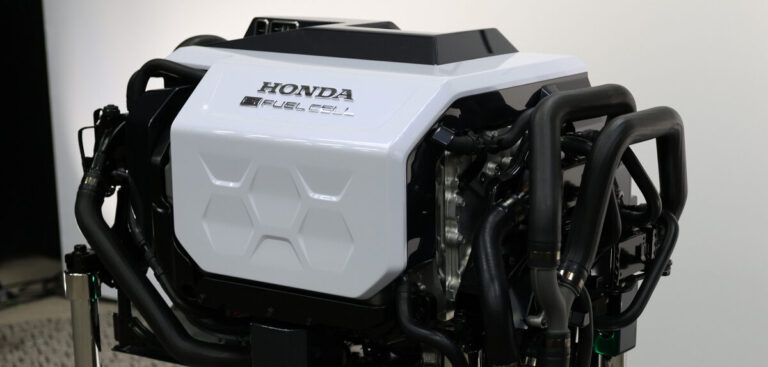Honda has set itself a target of achieving carbon neutrality from all of its activities by 2050, with the lofty aim of “zero environmental impact” in the entire lifecycle of its products across the various industries its serves, including automotive.
As part of this effort, Honda says it will expand the applications of its fuel cell systems, not only to Honda FCEVs but also to various internal and external applications, with the intent of stimulating demand for hydrogen and facilitating the carbon neutrality of society through the “use” of hydrogen.
Looking to its automotive product lines. In 2024, in North America and Japan, Honda will launch a FCEV model based on the CR-V, equipped with the next-generation fuel cell system jointly developed with GM. The company notes that while cost and durability are viewed as typical challenges that needed to be addressed to facilitate widespread use of fuel cell systems, this next-generation fuel cell system, which leverages the knowledge, know-how and economies of scale of both companies, will reduce the cost to one-third compared to the cost of the fuel cell system in the 2019 Honda Clarity Fuel Cell.
Honda says that this significant cost reduction was achieved by various measures including the adoption of innovative materials for electrodes, advancement of a cell sealing structure, simplification of the supporting equipment (“balance of plant”) and the improvement of productivity. Moreover, the durability of the system was doubled by the application of corrosion-resistant materials and controlled suppression of deterioration, and low temperature resistance was also increased significantly.
Building on these achievements through co-development with GM, looking ahead to 2030, when fuel cell use is expected to begin to advance toward full-fledged popularization, Honda has begun fundamental research on future fuel cell technologies. Its target is to halve the cost and double the durability compared to the fuel cell system co-developed with GM. The ultimate goal is put FCEVs on par with conventional diesel engines in terms of cost and usability.
In Japan, Honda plans to start demonstration testing on public roads by March 2024 of a prototype fuel cell-powered heavy-duty truck being researched jointly with Isuzu Motors. It has already started testing of FCEV-equipped commercial vehicles in China as part of a collaboration with Dongfeng.


